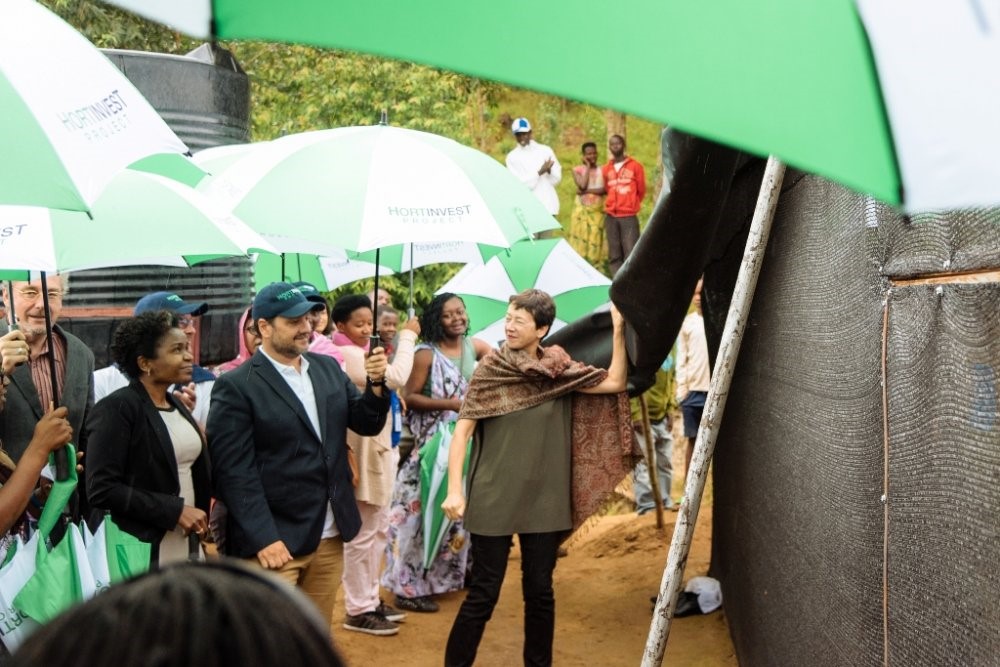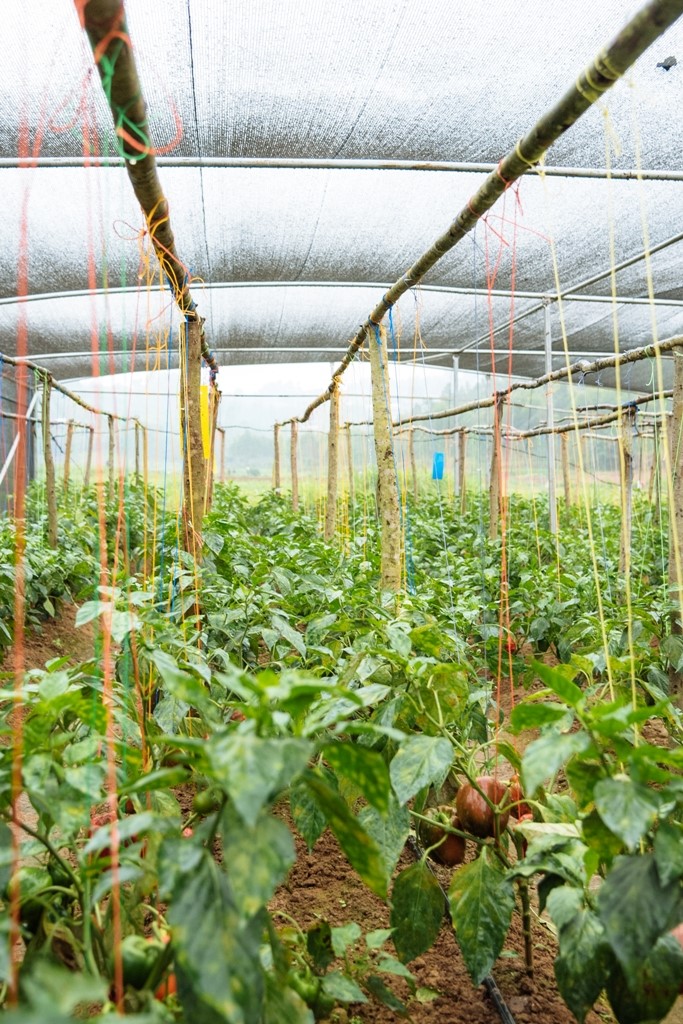HortInvest project strengthens Rwandan horticulture sector
03-06-2019‘Investing in Horticultural Development in Rwanda’ (HortInvest) is a four-year horticultural value chain-strengthening project funded by the Embassy of the Kingdom of the Netherlands (EKN) in Rwanda. The project supports the overall objective of Rwandan National Horticulture Policy in terms of fast economic growth and rapid reduction of poverty and malnutrition in Rwanda, and focuses on the northwestern districts of Muhanga, Karongi, Rutsiro, Rubavu, Nyabihu and Ngororero. Led by SNV, the implementing consortium includes IDH – the Sustainable Trade Initiative, Wageningen University & Research, Agriterra and Holland Greentech.
Jos Heermans from COSUN sharing with farmers the disease management practices
The HortInvest project aims to increase farmers’ incomes, grow the relative contribution of the horticultural sector to the economy of Rwanda, and improve the food and nutrition security of households. This market-led project focuses on fruit and vegetable value chains for domestic, regional and international markets. Key target groups are small- and medium-sized farmers, farmer cooperatives, and companies. As a result of the project 40,000 small holder farmers will increase their income, 30 horticulture SMEs will have higher turnover, horticulture business cases will be developed, and cooperatives will be strengthened. The project is currently providing support through six demonstration sites that offer training on best agricultural practices and Integrated Pest Management, post-harvest produce handling, value addition and market demand for specific horticultural value chains.
The HortInvest project has an Investment and Innovation Fund (IIF) that supports business cases and innovation projects led by companies and cooperatives. The total fund amounts to € 5 million and is used to leverage private investments in horticulture sector development in the six target districts. A HortInvest project gender and youth group has developed a gender and youth strategy in collaboration with all project partners, detailing how the various project activities will deal with the differences between men and women and the challenges of youth.

Dutch Ambassador Rwanda HE Frédérique de Man officially launching the Hortinvest Project on 6th March 2019 at IABM cooperative in Muhanga
In the development of the exports market, HortInvest is supporting exporters throughout the value chain, from production to high-end markets. This support helps improve production techniques through assessments and elaboration of a tailor-made mechanisation plan for exporters in order to increase yields, make quality seeds available and diversify export crops, provide agronomic support to exporters, and improve the cold chain management. HortInvest also works on stimulating an improved enabling environment for horticulture sector development, by facilitating public-private consultations and through coordination efforts.
How does Agriterra contribute to the HortInvest Project?
Agriterra is responsible for selecting horticultural cooperatives and coach them under the HortInvest cooperative development trajectory using the Agriterra approach.
The project targets inclusion of 40 cooperatives in category 1 of its cooperative development trajectory and 60 small cooperatives, farmer groups or associations indirectly benefiting from the advisory services provided to category 1 or selected cooperatives following a graduation model. Category 1 includes cooperatives benefiting from an intensive cooperative business advisory trajectory. These cooperatives will draw up bankable investment plans, sharpen their business strategy, and optimise their production, processing and marketing activities. Category 2 includes cooperatives that are considered runners-up for the primary intervention method. They can participate in trainings relevant for small and young cooperatives (e.g. record-keeping trainings, MyCoop trainings). They are also invited for relevant trainings provided to the primary group of 40 cooperatives. It is anticipated that with the mentioned support, these cooperatives will be able to graduate to the category 1 level.
Agriterra supports horticultural cooperatives in different aspects such as establishment of demo plots in a cooperative in the proximity of members; development of business plans for collective collection and selling of members’ produce (vegetables and fruits); creating business linkages for financing and market opportunities; training of model farmers in good agricultural and post-harvest handling practices; mobilisation of new members; and expansion of land under cultivation.
In addition, Agriterra provides specialised advisory services aimed at improving accounting and financial management practices, business planning and implementation, good cooperative governance, training the cooperative in record-keeping at the farmer level, and organising exchange visits for horti coops.
Agriterra also links cooperatives to Dutch, regional and international agri-sector experts through Agripool expert assignments. In 2018, the HortInvest Project hosted five Agripool experts on different topics, including good agricultural practices for onions by Hans van Leeuwen from Groot & Sloot, vegetable best disease management and control practices by Jos Heermans from COSUN, good agricultural practices for pineapples and how to induce pineapple flowering for commercial farms by Damien KIKI from Repab in Benin, a Business Development workshop for horticultural coops by Frank Hollar from Flynth, and a vegetable seed business exploratory workshop by Rien van Bruchem from Bejo.

Sweet pepper demo at IABM cooperative in Muhanga, southern province of Rwanda
What are the results so far?
Within one year of project implementation, Agriterra recruited 10 coops in category 1 and 15 coops in category 2, which was the target for 2018. Agriterra supported the cooperatives in mobilising new members, to help them increase their social capital and area under cultivation so they can access bigger markets. About 150 representatives and staff from cooperatives have been trained on MyCoop, which gives them the basics of cooperative governance and member services. The cooperative-led farmers have been trained on good agricultural practices for different fruits and vegetables. Cooperatives have been supported in developing business plans and accounting procedure manuals, which helps them professionalise their business and increase internal financial transparency. Agriterra is also supporting cooperatives in exchange visits and market linkages; five cooperatives have already been linked to new buyers and financial institutions.
The project achievements so far contribute to Agriterra’s 2020 goals, which include reaching 1 million unique farmers, mobilise loans, and increase the number of paying members – the project already added 2165 members to the Agriterra farmers reached in cooperatives. One cooperative was supported to secure a matching grant worth € 50,000 and its own contribution of € 63,000. The cooperatives were also supported in the recruitment of 142 new paying members.
The farmers are realising the impact of the project in changing their mindset and agricultural practices within the cooperatives. Mr Damien Ngwabije, a lead farmer in a sugar snap-growing cooperative, testified that ‘the project helped us as a cooperative to improve our agricultural practices from the choice of seeds to harvesting, where the choice of seeds, varieties, quality and quantity to produce are determined by the market available. We also learned how to improve our cooperative governance and management practices, and increase the services we provide to farmers as well as discover other services that as a cooperative we should be providing to our members’.
Plans for 2019 are to recruit 15 new category-1 coops and 25 new category-2 coops, which means that this year we will have a cumulative HortInvest portfolio of 65 coops in both categories combined.
